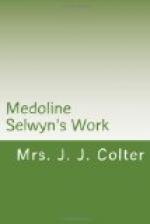Mrs. Flaxman, I was finding, had a way of setting me thinking about serious things, and yet the thoughts were mainly pleasant ones. She was different from any one I ever knew. I found her presence so restful. I had the impression that some time in her life she had encountered storms, but the mastery had been gained; and now she had drifted into a peaceful harbor. Looking back now over longer stretches of years and experiences than I then had, I can recall a few other persons who impressed me in a similar fashion. But they were rare and beautiful exceptions to the scores, and even hundreds of average human folk whom I have known.
After we had driven some distance, Thomas turned to inquire if we were going to the grave.
“It is a shady drive good part of the way; trees on one side and the water’s edge bordering the other. Perhaps we might as well go.”
“They’d take it very kind of you, ma’am, I am sure,” Thomas responded, although her remarks were addressed to me. Evidently he was very willing to exercise the horses, notwithstanding his press of work.
We sat in the carriage at the door of Daniel’s cottage. The house seemed full, and quite a crowd were standing outside.
“They have shown the poor thing a good deal of respect,” Mrs. Flaxman whispered to me as she glanced at the numerous assemblage.
Suddenly, on the hush that seemed to enfold everything, there broke weird, discordant singing—women’s voices sounding high and piercing, the men’s deeper and more melodious. The hymn they sang was long, and the air very plaintive, bringing tears to my eyes, and causing the strange, oppressed feeling of the preceding day to return. When the singing ceased I noticed the men removing their hats, and a moment after a stentorian voice speaking loudly. I glanced around amazed, but Mrs. Flaxman noticing my surprise, whispered, “It is prayer.”
If the singing made me nervous the prayer intensified the feeling. In the hot, midsummer air, so still the leaves scarce rippled on the trees, I could, after a few seconds, distinguish every word the man uttered. Accustomed to the decorous prayer of the German pastors our teachers had taken us to hear, this impetuous prayer to the Deity awed me. He talked with the invisible Jehovah as if they two were long tried friends, between whom there was such perfect trust; whatever the man asked the God would bestow. First there was intercession, pleading for forgiveness for past offences, and for restraining grace for future needs. Afterward he spoke of Death, the common inheritance of each of us, and the pain his entrance had caused in this home, and then followed thanksgiving that through Christ we could conquer even Death himself. I shall never forget the triumphant ring in that man’s voice as he passed on to the joy of those who, trampling on Death, have passed safely within the light of God.
“If one of the old masters had heard that man’s prayer to-day, he would have set it to some grand music. It reminds me of a Te Deum or oratoria,” I said to Mrs. Flaxman, when the benediction was pronounced. The tears were in her eyes, but her face was shining as if some inner light were irradiating it.




